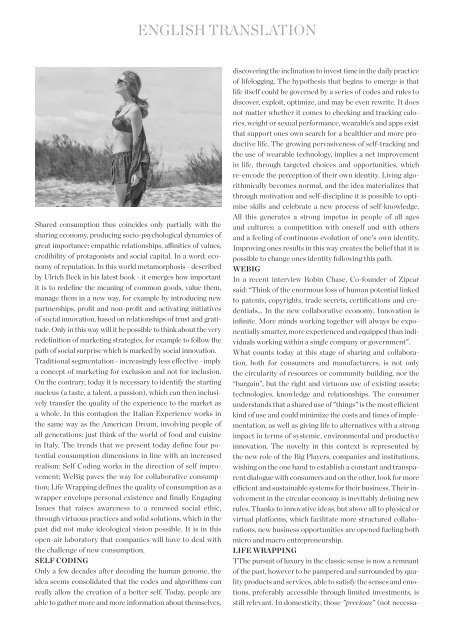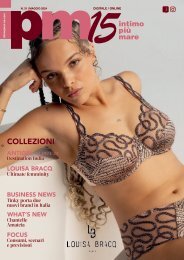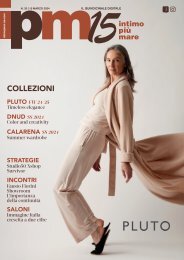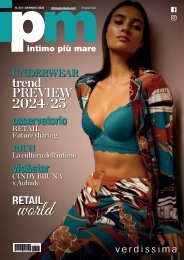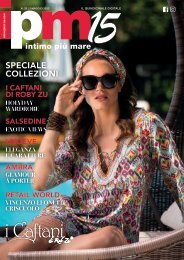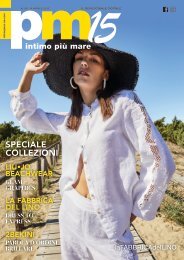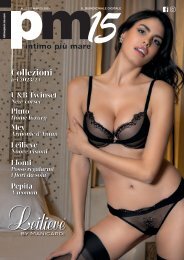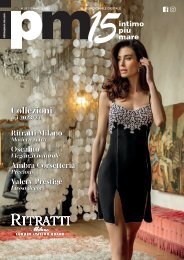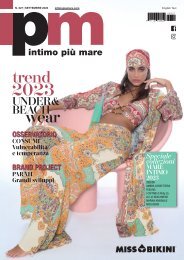You also want an ePaper? Increase the reach of your titles
YUMPU automatically turns print PDFs into web optimized ePapers that Google loves.
ENGLISH TRANSLATION<br />
Shared consumption thus coincides only partially with the<br />
sharing economy, producing socio-psychological dynamics of<br />
great importance: empathic relationships, affinities of values,<br />
credibility of protagonists and social capital. In a word: economy<br />
of reputation. In this world metamorphosis - described<br />
by Ulrich Beck in his latest book - it emerges how important<br />
it is to redefine the meaning of common goods, value them,<br />
manage them in a new way, for example by introducing new<br />
partnerships, profit and non-profit and activating initiatives<br />
of social innovation, based on relationships of trust and gratitude.<br />
Only in this way will it be possible to think about the very<br />
redefinition of marketing strategies, for example to follow the<br />
path of social surprise which is marked by social innovation.<br />
Traditional segmentation - increasingly less effective - imply<br />
a concept of marketing for exclusion and not for inclusion.<br />
On the contrary, today it is necessary to identify the starting<br />
nucleus (a taste, a talent, a passion), which can then inclusively<br />
transfer the quality of the experience to the market as<br />
a whole. In this contagion the Italian Experience works in<br />
the same way as the American Dream, involving people of<br />
all generations: just think of the world of food and cuisine<br />
in Italy. The trends that we present today define four potential<br />
consumption dimensions in line with an increased<br />
realism: Self Coding works in the direction of self improvement;<br />
WeBig paves the way for collaborative consumption;<br />
Life Wrapping defines the quality of consumption as a<br />
wrapper envelops personal existence and finally Engaging<br />
Issues that raises awareness to a renewed social ethic,<br />
through virtuous practices and solid solutions, which in the<br />
past did not make ideological vision possible. It is in this<br />
open-air laboratory that companies will have to deal with<br />
the challenge of new consumption.<br />
SELF CODING<br />
Only a few decades after decoding the human genome, the<br />
idea seems consolidated that the codes and algorithms can<br />
really allow the creation of a better self. Today, people are<br />
able to gather more and more information about themselves,<br />
discovering the inclination to invest time in the daily practice<br />
of lifelogging. The hypothesis that begins to emerge is that<br />
life itself could be governed by a series of codes and rules to<br />
discover, exploit, optimize, and may be even rewrite. It does<br />
not matter whether it comes to checking and tracking calories,<br />
weight or sexual performance, wearable’s and apps exist<br />
that support ones own search for a healthier and more productive<br />
life. The growing pervasiveness of self-tracking and<br />
the use of wearable technology, implies a net improvement<br />
in life, through targeted choices and opportunities, which<br />
re-encode the perception of their own identity. Living algorithmically<br />
becomes normal, and the idea materializes that<br />
through motivation and self-discipline it is possible to optimise<br />
skills and celebrate a new process of self-knowledge.<br />
All this generates a strong impetus in people of all ages<br />
and cultures: a competition with oneself and with others<br />
and a feeling of continuous evolution of one's own identity.<br />
Improving ones results in this way creates the belief that it is<br />
possible to change ones identity following this path.<br />
WEBIG<br />
In a recent interview Robin Chase, Co-founder of Zipcar<br />
said: “Think of the enormous loss of human potential linked<br />
to patents, copyrights, trade secrets, certifications and credentials...<br />
In the new collaborative economy, Innovation is<br />
infinite. More minds working together will always be exponentially<br />
smarter, more experienced and equipped than individuals<br />
working within a single company or government".<br />
What counts today at this stage of sharing and collaboration,<br />
both for consumers and manufacturers, is not only<br />
the circularity of resources or community building, nor the<br />
“bargain”, but the right and virtuous use of existing assets:<br />
technologies, knowledge and relationships. The consumer<br />
understands that a shared use of "things" is the most efficient<br />
kind of use and could minimize the costs and times of implementation,<br />
as well as giving life to alternatives with a strong<br />
impact in terms of systemic, environmental and productive<br />
innovation. The novelty in this context is represented by<br />
the new role of the Big Players, companies and institutions,<br />
wishing on the one hand to establish a constant and transparent<br />
dialogue with consumers and on the other, look for more<br />
efficient and sustainable systems for their business. Their involvement<br />
in the circular economy is inevitably defining new<br />
rules. Thanks to innovative ideas, but above all to physical or<br />
virtual platforms, which facilitate more structured collaborations,<br />
new business opportunities are opened fueling both<br />
micro and macro entrepreneurship.<br />
LIFE WRAPPING<br />
TThe pursuit of luxury in the classic sense is now a remnant<br />
of the past, however to be pampered and surrounded by quality<br />
products and services, able to satisfy the senses and emotions,<br />
preferably accessible through limited investments, is<br />
still relevant. In domesticity, those "precious" (not necessa-


